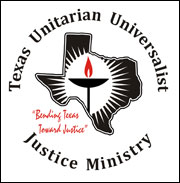Texas congregations form social justice network
The Texas UU Justice Ministry seeks to amplify UU voices in the public square.
The Texas UU Justice Ministry (TXUUJM), was formed by identifying congregations that were already deeply engaged in social justice work by virtue of being members of Industrial Areas Foundation affiliates across Texas. The IAF is a national network formed by labor organizer Saul Alinsky in 1940 to help religious and civic groups work together on social issues. This way of engaging in social justice work is also known as “CBCO,” for congregation-based community organizing.
Mike Phillips, with First UU Church of San Antonio and the TXUUJM steering committee chair, said there had been a growing interest in a justice ministry in Texas. Then in January 2012 Emerson UU Church in Houston initiated a state UU gathering focused on forming such a ministry. “We gathered interested ministers and leaders from across the state, and after meeting together at Live Oak UU Church, Cedar Park, we decided to form a nonpartisan justice network for UU congregations in Texas,” said Phillips, who has long been active in UU justice work in the state.
The group has named the Rev. Chuck Freeman, minister of Free Souls Church, Round Rock, as executive director.
Phillips noted that congregations involved with the 10 IAF affiliates in Texas already have issues they’re working on through that organization and through other social justice networks, including funding for public education, affordable access to health care, and immigrant rights. “Some of these are issues that a new group like TXUUJM might have difficulty tackling on its own,” he said. “It makes sense to us to add our UU voice to that of a partner that has the experience and numbers to make a larger statement.”
He added, “With networks already engaging UU churches around the state, we felt it would be counterproductive to start over with an exclusively independent UU state network effort that would ignore those ties.”
In addition to the issues UU congregations are working with through those networks, TXUUJM will engage congregations on issues that interfaith networks might not champion, said Alexandra Neville, a TXUUJM steering committee member from First UU Church of Austin. “As UUs we’ve been longtime leaders in supporting women’s health and reproductive choices, promoting the rights of LGBTQ people and families, and calling for environmental protection.”
The 10 member congregations at this point are: Bay Area UU Church, Houston; Community UU Church, Plano; Emerson UU Church, Houston; First UU Church of Austin; First UU Church of San Antonio; Northwoods UU Church, The Woodlands; Timberland UU Fellowship, Lufkin; Thoreau Woods UU Church, Huntsville; UU Church of the Brazos Valley, College Station; and UU Church of Corpus Christi. Congregations pay $2 per member to join.
Phillips said the network is contacting all 49 active UU congregations in Texas. “I’m hoping the majority will join,” he said. Freeman noted that the new network is especially resonating with small, remote congregations. “It’s pretty clear that for some of the smaller ones this is a really empowering thing. I visited a congregation of 60 members recently and they were just really excited to get involved.”
The Timberland UU Fellowship in Lufkin, Texas, about 120 miles northeast of Houston, is just completing the process of joining. Member Glenn Donnahoe said individuals in the 22-member fellowship have long been active in social justice work, but there has been less opportunity to connect with other UU congregations in justice-making. “When we were approached, it sounded like something we wanted to do. We’re deep in the heart of East Texas, a nice community, but very conservative. We’ve just become a Welcoming Congregation and we felt like this was a good next step. It’ll be nice to work with other UUs out there on the same issues.”
Freeman has other experience with state networks. He is on the board of Texas Impact and was a founder of the Texas Freedom Network, two interfaith advocacy groups that TXUUJM will also work with. He said justice initiatives will come from congregations, IAF groups, and TXUUJM’s own advisory teams.
Neville added that the process itself of deciding whether to join TXUUJM was helpful to her congregation. “I’ve been helping my congregation discuss what issues are important to us. We came up with a list of our positions. It was a really good experience to think about how we feel about topics in the legislature. It’s been a nice spiritual practice to lay that out. And it helps people define their values before they go talk to their legislators.”
Said Phillips, “My church in San Antonio went through a visioning process, not just focusing on legislation, but sharing best practices for social justice committees and similar issues.”
The new organization will have no physical office. “We’re going to use technology as much as we can, including Skype and video conferencing,” said Freeman.
The TXUUJM anticipates a budget of about $50,000. It has received $22,000 from the Fund for UU Social Responsibility and additional contributions from congregations and individuals. Fundraising is continuing.
Others states with UU social justice ministries are California, Florida, Maryland, Massachusetts, Michigan, Minnesota, Missouri, New Jersey, New York, Ohio, Oregon, Pennsylvania, Rhode Island, and Washington.
The Rev. Philip Douglas, minister of the UU Church of Corpus Christi, is a member of the TXUUJM steering committee and the church he serves has recently joined the Justice Ministry. He noted, "Texas is a state with very quickly changing demographics. Corpus Christi is a majority Hispanic city, and soon the rest of Texas will be changing, too,” he said. “This is an exciting time to raise our voices and proclaim our values in the public square."
See sidebar for links to related resources.
Comments powered by Disqus







